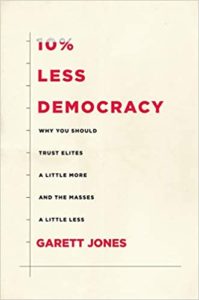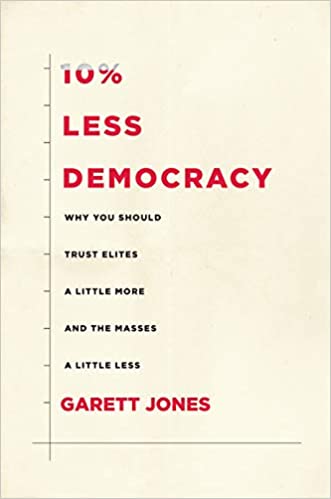
One of the principles I taught my economics students the first day of class and then applied incessantly thereafter was the importance of thinking on the margin. Garett Jones, an economics professor at George Mason University, has written a whole book in which he does just that. Jones considers what would happen if we made highly democratic countries less democratic and entrusted certain political decisions more to unelected officials. If you think he’s attacking democracy, you’ll miss his point. He is calling for slightly less democracy. In short, he is thinking on the margin.
In what will probably be one of the most important books of 2020, Jones argues that if we made the United States and many other countries slightly less democratic, we would get slightly more freedom and slightly better policies. He makes his case by examining the details of central bank policy on inflation, appointed versus elected judges, restrictions on who can vote, the effects of the European Union, and the extreme case of Singapore.
Refreshingly, he knows how to coin humorous but informative lines. For example, in discussing William F. Buckley Jr.’s famous statement that he would rather be governed by the first 2,000 names in the Boston phone book than by the Harvard University faculty, Jones proposes an alternative. “Rather than being governed by the masses of Boston or by the professors of Harvard,” he writes, “I’d far rather be governed by the engineering faculty of MIT.”
I started reading his book as someone who hates having important decisions made by “faceless bureaucrats.” I ended by thinking, along with Jones, that that might be better. He makes clear that basic democracy is good for a simple, important reason: “democracies don’t engage in widespread slaughter of their own citizens.” Thus, he calls for only slightly less, rather than a lot less, democracy.
This is from David R. Henderson, “Slightly Less Democracy Means Slightly More Freedom,” Regulation, Summer 2020.
Another excerpt from my review:
When Republicans took control of the U.S. House of Representatives in the 2010 elections, they fulfilled their pledge to eliminate earmarks—specific spending added to legislation to help constituents in various members’ districts. Jones predicted at the time that the reform would make it harder to rein in federal spending. Earmarks, he notes, were never more than 1% of federal spending, but were useful for persuading various members to vote for bills that reined in spending overall. He admits that he was “wildly incorrect” at first. Congress, along with President Obama, did start to get discretionary federal spending under control. But, argues Jones, in the long run—where we are now—he has been proven right: “In the U.S. Congress, with the decline of earmarks, the biggest games left in town are ideological outrage, social media grandstanding, and other behaviors that make individual politicians more willing to stand up to party leaders.”
The above is one of the points on which I was most persuaded to change my mind. Bring back earmarks!
Read the whole thing.
I notice that co-blogger Bryan Caplan, a colleague of Garett Jones, has earlier posted a more-critical review than mine.


READER COMMENTS
Jon Murphy
Jun 19 2020 at 2:12pm
I’ve enjoyed what I have read of Garett’s book. It is the kind of book one has to read very carefully. It should be chewed and digested, to use Bacon’s phrasing.
Michael S.
Jun 19 2020 at 5:04pm
“It should be chewed and digested, to use Bacon’s phrasing.” That was an involuntary pun 😉
Jon Murphy
Jun 19 2020 at 5:55pm
Hahaha I didn’t catch that!
David Seltzer
Jun 22 2020 at 5:40pm
You are sizzling
Thomas Hutcheson
Jun 21 2020 at 9:52am
It depends on which 10%. 🙂
Mark Brady
Jun 21 2020 at 8:53pm
“Do American troops help or hinder economic growth in other countries? We use
a newly constructed dataset of the deployment of U.S. troops over the years 1950-
2000, and discover a positive relationship between deployed troops and host
country economic growth, robust to multiple control variables. Each tenfold
increase in U.S. troops is associated with a one-third percentage point increase in
average host country annual growth. We explore three possible causal
explanations: a Keynesian aggregate demand boost, the diffusion of institutions,
and security. Extensive econometric testing, including the use of panel data,
confirms the core relationship. The relationship is strongest in the poorest
countries.”
This comes from “U.S. Troops and Foreign Economic Growth” (2011), a paper that Garret Jones co-authored with Tim Kane.
If this is what Jones has in mind when he speaks of “rule by experts,” I want more democracy!
Mark Brady
Jun 21 2020 at 8:58pm
Oops! That should of course be Garett Jones.
Comments are closed.